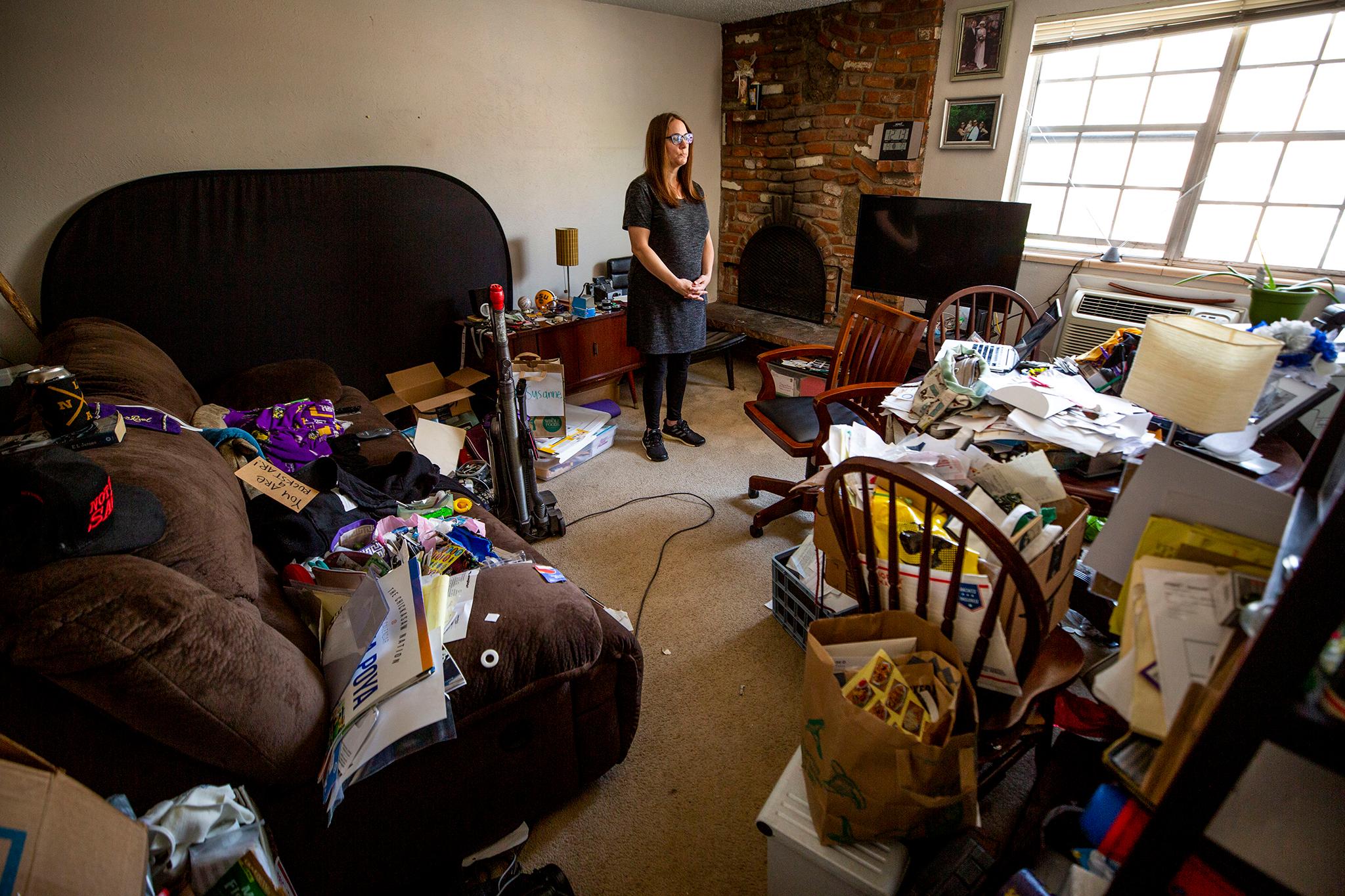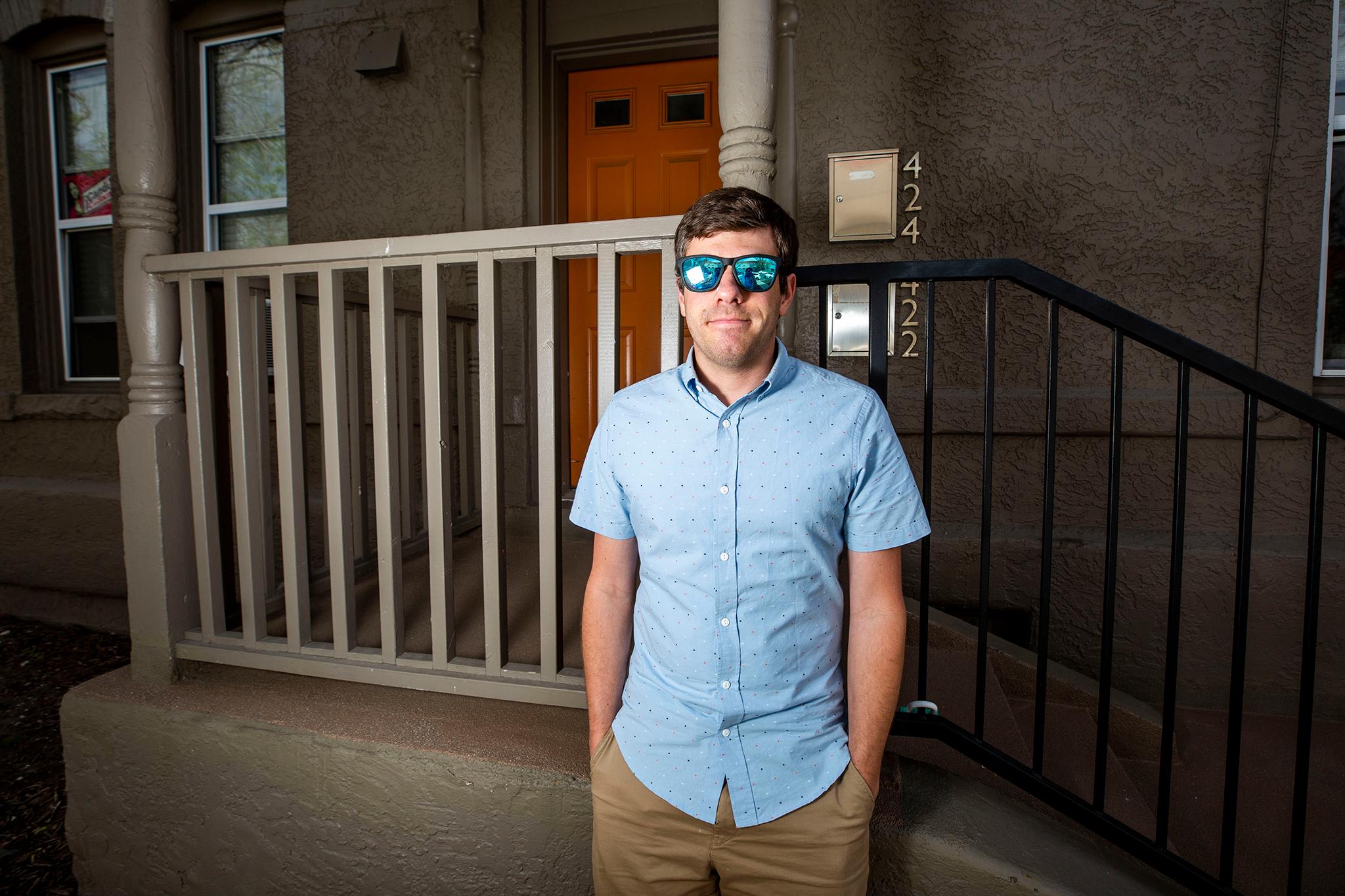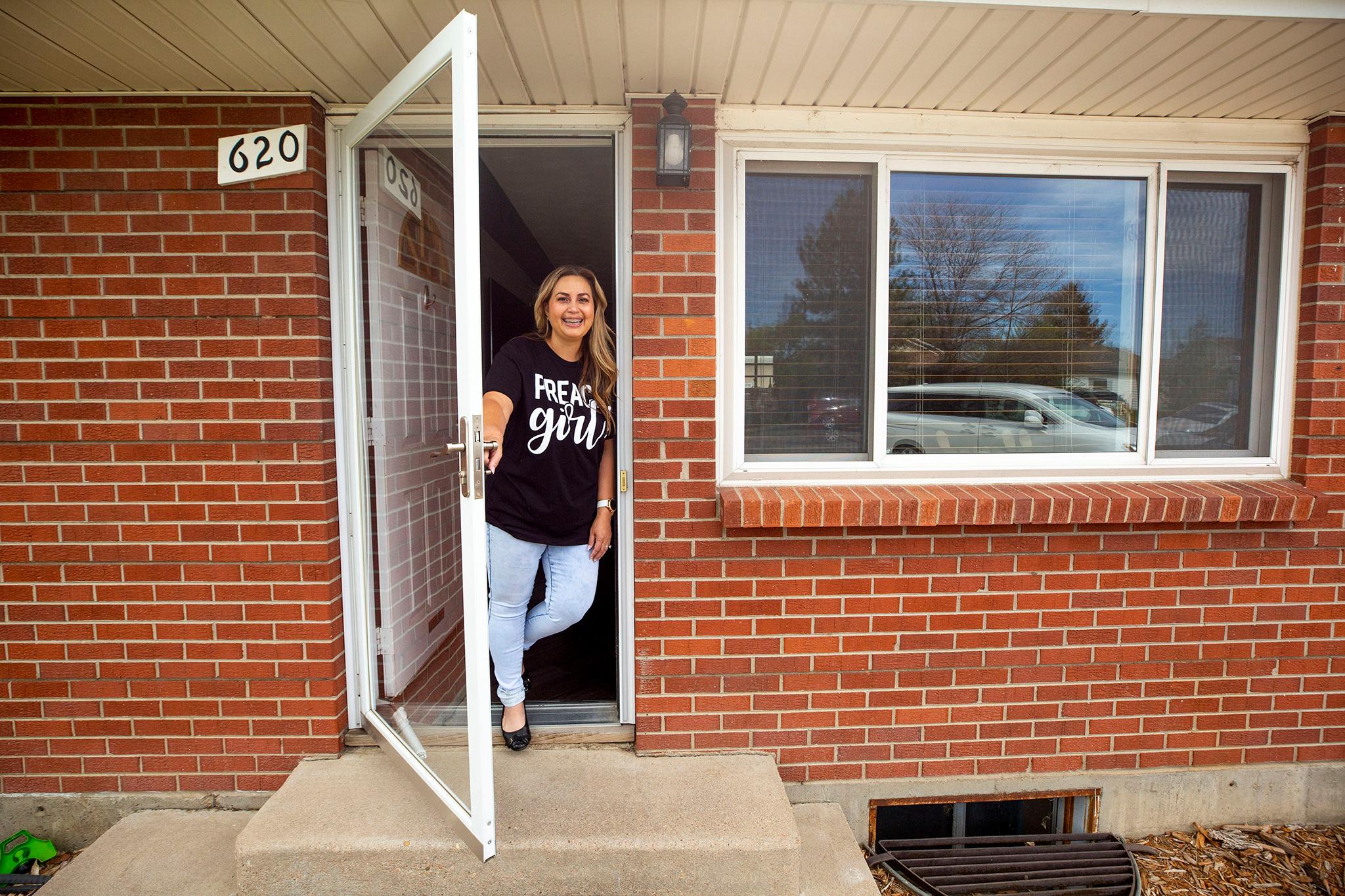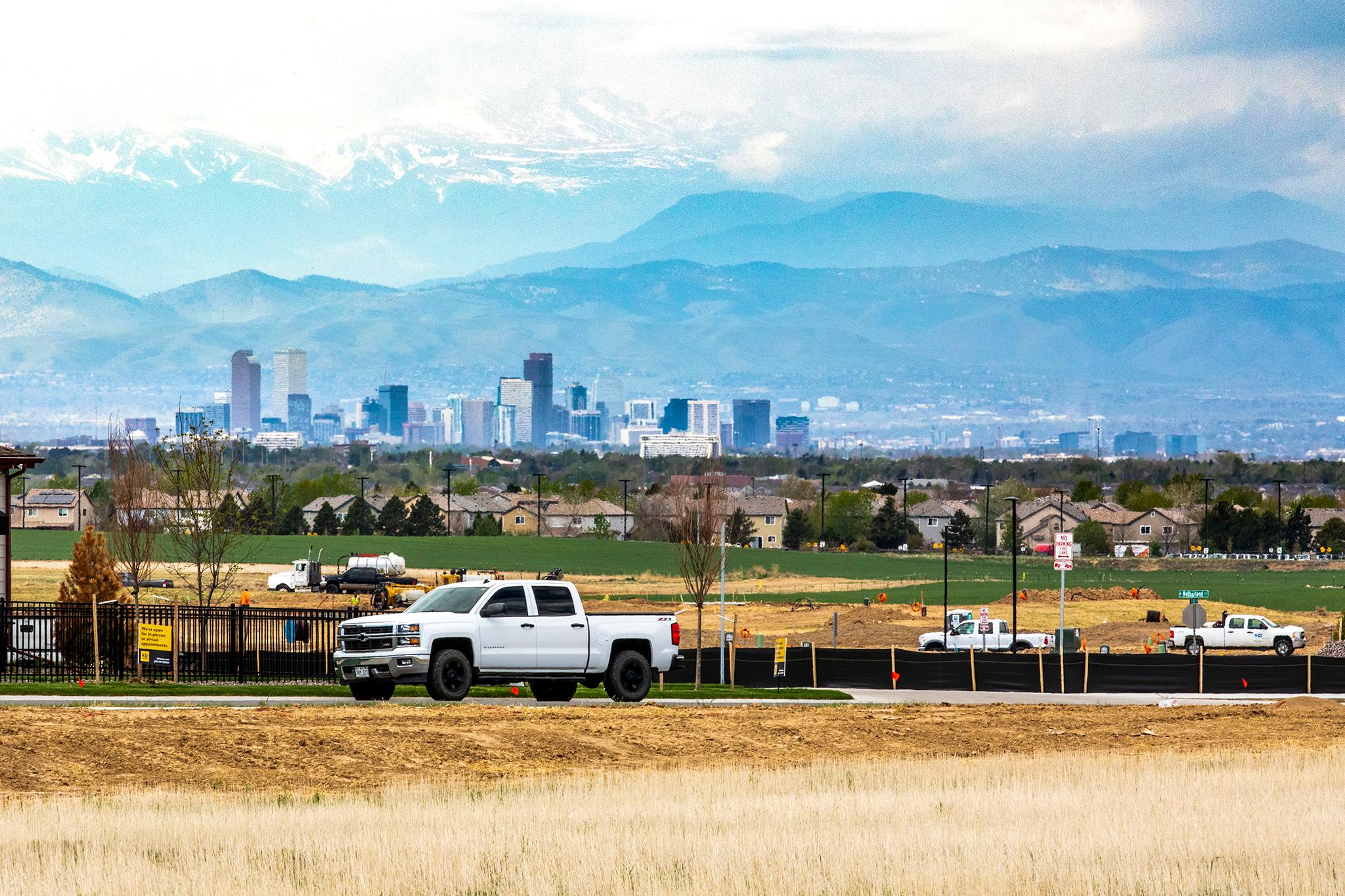Susanne Brasset loves watching the light from Denver's sunsets cascade on her neighborhood's older buildings.
The newer glass and concrete apartment towers that have risen in her neighborhood, Speer, aren't as appealing to the print-maker and photographer. But she knows their pricey amenities -- pools, gyms, bocce courts -- attract plenty of tenants.
Brasset has rented a 500-square-foot apartment in Speer since she moved to Denver from New Orleans in 2008. But she doesn't know how much longer she'll be able to stay in her home. Cerebral palsy has impaired her vision and mobility, and she pays the bills with federal rental assistance, Social Security disability income, and her earnings from her photography and work as an elementary school crossing guard.
After the couple that owned her building died in 2018, a large real estate company bought the red-brick complex built in 1967. The new owners initially raised her rent from $870 to $1,030, most of which is covered by her federal housing subsidy. But in February, Brasset received notice that her lease would not be renewed because her apartment needed to be vacated for a renovation, which she suspects will make rent even pricier. She was told she could stay until October at her current rent, giving her more time to find a new place.
"It's the only place I've ever lived in Denver," Brasset said. "You can imagine my shock at having to pack all my stuff up after so long."
According to the laws of supply and demand, those apartment buildings that have gone up around Brasset's home in the last few years should have lowered her rent, since more supply usually lowers prices. But that theory hasn't panned out in cities around the U.S., including Denver, where low-income renters like Brasset and middle-income earners like teachers, police officers and civil servants have been or are in danger of being priced out.
More bricks and mortar alone won't make housing more affordable. Denver real estate consultant Lori Greenly said it's going to take new thinking -- not just from policy makers, but builders and even existing residents -- to make housing attainable for all.
"We absolutely can build our way out" of the affordability crisis, Greenly said. But "we just have so much to do before that."

How did we get here?
Denver is among cities across the country where housing prices have outpaced wages. According to city figures, the median income in Denver increased about 8 percent between 2015 and 2018, while rent increased 13 percent and homes prices by 17 percent.
Prior to the Great Recession, metro Denver had more housing units than households, researchers Jennifer Newcomer and Phyllis Resnick wrote in a 2018 overview of the housing crisis for Shift, a data and analysis project of the Piton Foundation. But in recent years, Newcomer and Resnick found, the region has added people faster than it has added homes, eating up the pre-recession surplus of apartments and houses.
As prices go up, families are spending more of their earnings on housing. According to the federal Department of Housing and Urban Development, households that pour more than 30 percent of their income into mortgage payments or rent are in danger of having too little left over for other expenses or emergencies. In Denver, some 96,000 households that are earning less than the median income, currently almost $93,000 for a family of four, are spending more than a third of their earnings on housing.
Heather Lafferty worked in local and national roles with Habitat for Humanity for almost a decade before taking over the metro Denver operations of the international nonprofit housing developer in 2008. She said that even when Denver had enough housing, it did not have enough for its poorest residents.
"There's always been a need for affordable housing," she said. "There's always been people who have been left out."
As a nation, Lafferty said, "we are not prioritizing getting the poor into housing."
She pointed to the federal mortgage interest deduction, a tax write-off for homeowners, as an example of the government's priorities. Advocates for low-income families have long characterized the tax write-off as benefiting people with the means to own homes. Meanwhile, the main federal program benefiting low-income renters has struggled. In its latest survey of what it's like to rent housing in the United States, the Joint Center for Housing Studies of Harvard University said that federal spending on "rental assistance programs grew from $37.4 billion in 2013 to $40.3 billion in 2018 in real terms, an average annual increase of just 1.5 percent. The shortfall in federal spending leaves about three out of four of the 17.6 million eligible households without rental assistance." That means people end up on waiting lists for federal rental assistance, as Brasset was, for years. The coronavirus pandemic will inevitably deepen inequity.
New construction of affordable housing has also lagged behind other housing. According to Newcomer, research director at the Colorado Futures Center, an independent think-tank, that's because a developer will net the same cash flow from building a few luxury apartments as it would from many affordable units. Building more units exposes a developer to more risk, such as costly construction delays or mishaps.
Many developers play it safe and build at the luxury end, where unexpected expenses can more easily be passed on to consumers.
"It's just hard to build the supply needed," Newcomer said.
Resnick, Newcomer's boss at the Colorado Futures Center, said demand at the higher end of Denver's market "has probably been satiated a little bit. But I think it's a different story when you come to the core workforce" and lower-wage earners.
Rents are generally higher for newer properties, in part because they are more likely to have such sought-after extras as gyms and cinemas. According to the Colorado Apartment Association, a landlords industry group, metro Denver has some 68,842 apartments in high-end buildings erected since 2010, compared to 36,642 units in buildings of all ages that were financed using tax credits or subsidies to keep the rents below market rates. A total of 157,046 units fell somewhere in between -- older than those built since 2010, but among them some with attractive amenities and high rents. The apartment association compiled the data for properties with at least 50 units. The Denver area has another 100,000 units in smaller properties that were not included in the survey
Andrew Hamrick, who serves as general counsel for the Apartment Association of Metro Denver and the Colorado Apartment Association, backs an argument often heard in housing circles: The solution to the housing problem is not to build fewer expensive housing units. It's to build more.
Such an argument was bolstered by researchers at the W.E. Upjohn Institute for Employment and Federal Reserve Bank of Philadelphia who looked into the effects of new housing in low-Income areas in Denver and 10 other cities. The study, published last year, found that new buildings slow rent increases. The researchers said that if new buildings don't go up, high-income earners will just offer more money for existing housing.
"This raises the rents for everyone and lowers the ability of low-income residents to stay in or move to the area," they concluded.

Joe Szuszwalak pays $850 a month for his share of the rent and utilities for his Five Points apartment. It's money he would rather be putting toward a mortgage.
"Student loans are the primary reason why I can't save as much money as I want to for a down payment" to buy a home, said Szuszwalak, a communications specialist who grew up in Chicago and works for the federal government.
"There's positive sides to renting also. But it just feels like you're just throwing money away," he said. "I probably check (real estate listings) maybe every week or so, just to see if there's some kind of miracle affordable housing that pops up. I think it's more daydreaming than feeling hopeful at this point."
Szuszwalak said he understands why housing advocates focus on the struggles of lower-income households. But, he said, "I think there's a missing kind of middle component. I'm kind of in a weird place where I'm not making a ton, but more than a lot of income-restricted programs" allow.
The housing that would fit his budget -- he's looking for something under $250,000 -- is a condominium, Szuszwalak said. That's housing Denver is missing.
For years, Colorado's construction defects law, meant to protect consumers, was blamed for a lack of new condo construction. Critics said the law almost invited lawyers to organize condo owners to sue over construction problems, making insurance very expensive. The law changed in 2017 to require that more than half a complex's residents agree before suing the developer. Denver has also decreed that developers and contractors should get a chance to repair issues before lawsuits are filed. But the potential for legal action remains a concern, said real estate consultant Greenly, who specializes in condos.
"We need to be aggressively building middle-income housing," Greenly said.
Rusty Crandall, area president of the national developer Meritage Homes, said the home-building industry abandoned condos in Colorado the early 2000s.
"The entire segment is not being supplied because the builders didn't want to get sued," he said.
Meritage "is not venturing into the condo world. There's still too much risk there for us."
So how does Denver achieve affordability for all?
Szuszwalak's missing middle is getting attention from developers, who see opportunity there. Crandall thinks of his children: "How are they going to possibly be able to afford a home, even with a college education and a good job?"
Crandall's Meritage has taken steps to address that problem by developing townhomes, which are built close together, saving on land costs. At a townhome development in Aurora called Painted Prairie, Meritage further keeps prices in check by offering fewer options for items such as kitchen cabinets and bathroom faucets, allowing the developer to order in bulk economically. Plans are simpler and square footage smaller.
Crandall said his company has found that consumers are willing to give up such things as basements to save money. Meritage's compact Painted Prairie townhomes are selling in the low $300,000s, which is about $140,000 less than the median closing price of a home in Denver in April.
A smaller developer, Paul Malone, is also targeting middle-income buyers. Malone is bringing components of a 39-unit condo project he calls The Nightingale from a modular housing factory in Minnesota to erect at a site in Denver's Uptown neighborhood. Because of the risk of being sued presented by the construction defects law, he said, his insurance costs are three times what they would be if he weren't building condos. He's starting small and intends to build strong relationships with his buyers, hoping that will encourage them to work with him to address any concerns rather than going to court.
Modular construction is seen as a way to build more efficiently. Nightingale will have studios starting at $250,000, one-bedrooms at $299,000 and two-bedrooms at $437,000. According to the Denver Metro Association of Realtors, the median price of a condo in April was $322,000.
Malone acknowledged his 39 units won't have a big impact on supply. But he said other developers were also considering building mid-priced condos.
"I wish more would," Malone said. "Because it's important for millennials to be able to afford to buy homes."
Habitat for Humanity's Lafferty is developing for-sale housing for families that don't have the buying power of the customers Malone is targeting. And she wants help from policymakers.
Lafferty suggested, for example, that cities could lower planning and permitting fees required of developers if they build housing within reach of low- and moderate-income renters or buyers.
Denver is considering just that, said Laura Aldrete, who heads the department in charge of determining whether a developer's plans meet the city's criteria for issuing building permits. Aldrete said her Department of Community Planning and Development is embarking on a pilot project that will offer expedited permitting and reduced fees for developers of affordable housing.
Aldrete added that she is working with Britta Fisher, head of Denver's housing department, on a project exploring how zoning can increase affordability.
"Zoning for many years did just the opposite," Aldrete said. (Zoning vast tracts of Denver and cities across the country for single-family homes, for example, ate up land, driving up land costs.)
As part of their project, Aldrete is considering approaches such as allowing more duplexes and triplexes to add density. Fisher said accessory dwelling units, now legal in 25 percent of Denver, are another way to gently increase the number of people living on any one parcel of land. ADUs, or granny flats, could also create ways for low-income families to earn income or for several generations of one family to live near and support each other, Fisher said.
But ADUs can be expensive. Last year, Denver City Council approved a $500,000 fund for west side residents to build ADUs on their property. Low-income homeowners who agree to rent out the properties at below-market rates can get loans of up to $25,000 to put toward building a second home. Homeowners only have to pay the loan back if they sell the property within 25 years.
Housing advocates are cautiously optimistic about Denver's affordable housing efforts, which have seen missteps in the past. Perhaps most notably, a program intended to sell 1,400 homes to people earning below the area median income mistakenly allowed 300 homes to go to higher earners.
In 2017, Mayor Michael Hancock made a push to help low- and moderate-income families get into empty market-rate apartments. That led to the Lower Income Voucher Equity program, or LIVE Denver, under which landlords could get city subsidies so that families earning between 40 and 80 percent of the area median could get housing. So far, only 17 families have been placed in housing through LIVE Denver.
Fisher, the city's housing chief, said the city was evaluating the initiative. She said high turnover among property managers has meant the city has had to keep educating landlords about how the program works.
In 2017, the city launched a housing fund with the goal of creating and preserving more than 6,200 affordable homes in a decade. It started with $15 million and has since doubled.
The fund is chiefly used to dole out grants and loans to help private developers offering housing below market rates. It's financed in part by taxes, including on marijuana, and in part by fees paid by developers that don't want to build below-market-rate housing themselves.
Greenly said that in lieu of contributing cash to a fund, perhaps developers should be required to build a certain amount of affordable housing in a city that currently has about 23,000 income-restricted homes."
"We need the housing," she said.
Fisher said the city can create incentives for developers without eliminating old ones. She pointed to zoning changes in recent years that have allowed developers to build taller if they include affordable housing in projects.
"It's not about removing a single tool or adding a single tool," Fisher said.
She said new sources of funding are needed to get below market-rate housing built. The main financing tool for decades has been federal tax credits. Developers who are awarded credits sell them to investors for cash they then use to build. A state agency distributes both state and federal tax credits on a competitive basis, usually receiving many more applications than it can satisfy. Often, developers apply several times before winning a grant.

Who is responsible for affordable housing?
James Roy II, a community organizer in Denver, wants the discussion to move beyond developers and policymakers. He said hospitals and schools, whose employees are being priced out of the Denver housing market, can provide solutions such as donating land or making grants to bring down the cost of housing. Roy said financial coaching, home ownership classes and other tools need to be more widely deployed to help poor families prepare to buy homes.
"It's families that we're impacting. It's individuals. It's children," Roy said. "Thinking about it as production of housing misses the entire point."
Elena Martinez picked up a flyer about a home ownership class a few years ago. As a child, Martinez had shuttled between the homes of her mother in Los Angeles and her father in Denver. She has experienced homelessness.
"I wanted a place of stability. I didn't have that growing up," she said.
In some ways, the home ownership course she took left Martinez downhearted. She met classmates who were better prepared and realtors and loan officers who were not encouraging.
"I kind of felt hopeless. Like I didn't have the criteria to purchase a home," she said. "I didn't have savings or a cushion."
Martinez didn't give up. She moved in with one of her daughters to save money and pay off bills. Two years ago, Martinez bought a house in Brighton. She'd rented for eight years in Denver's Globeville neighborhood and liked it there, but Brighton was where she could afford to buy. She said she did not want to spend more than $320,000.
Martinez learned in the home ownership class about loan and down payment assistance programs offered by organizations such as the Colorado Housing and Finance Authority. Martinez eventually saved $5,000 and got $15,000 in down payment assistance from CHFA in the form of a second loan.
Martinez has her own business, EHijole Tacos and Catering. She recently also started working the overnight shift as a psychiatric technician at a rehabilitation facility for women recovering from substance abuse. Her husband also has two jobs, as a delivery man and as a street maintenance worker for the city of Denver. Her mortgage is $2,160 a month, almost double what she was paying for rent. She pays $2,300 a month because she wants to get ahead.
"I really wanted that structure (of owning a home) when I was younger," she said. "Sadly, I never accomplished it. Now I'm a grandmother, and I've done it."
In addition to that home ownership class, Martinez credits organizations that have helped her become an entrepreneur.
Yessica Holguin is executive director of Denver's Center for Community Wealth Building, which uses job training, entrepreneurship development and other strategies to help people from historically overlooked communities gain economic self sufficiency.
"It wouldn't be bad if we were building $2,500 (a month) apartments if people could afford to live there," Holguin said.
Holguin's organization helped Martinez start her catering business and find work in the food industry even after the pandemic shuttered much of Denver's economy.
Eric Kornacki is also concerned with economic viability of buying a home in Denver. In 2009 he helped launch a food security project that grew into the Re:Vision nonprofit in Westwood. He recently left Re:Vision for a new nonprofit called the Uplands Community Collective, which works alongside a home builder.
Kornacki is charged with ensuring, among other things, that locals are hired to build the development project Uplands's home builder, Jeff Handlin, is proposing: 2,350 apartments, townhomes and single-family detached homes offered at different prices, as well as businesses and recreational areas, on a plot in Westminster, just north of Denver.
Handlin has received some push back from area residents worried about losing open space and gaining what they see as too many neighbors.
"We need density to make our neighborhoods more inclusive. I know it's not popular," Handlin said. "We all have to think about how many people do we want to have access to our housing eco-system. The tent's got to get bigger."
Gene Myers, CEO of Thrive Home Builders, specializes in homes for low- and moderate-income earners. Myers prides himself on the energy efficiency of his products, saying that keeps them affordable after families move in.
Myers just sold the 271st home in one of his projects in Stapleton. He said he had heard disparaging comments from more established residents about what the new homeowners might bring to the neighborhood. Their fears did not come to pass, he said.
"There are no couches on front porches," he said. "All they needed was a chance."
Correction: Due to a reporter's error, a previous version of this story incorrectly stated that Gene Myers has built homes for the Colorado Community Land Trust. He has not.













